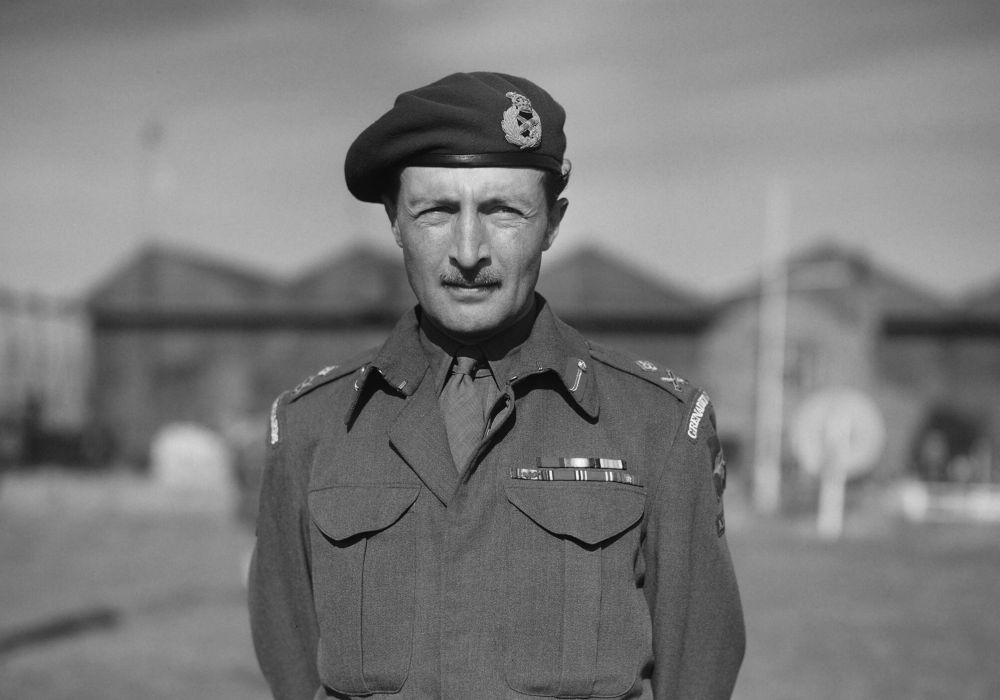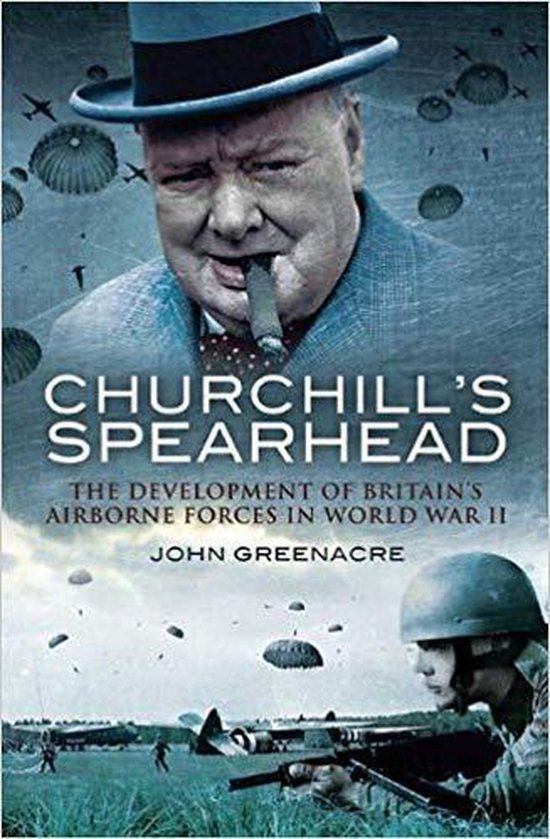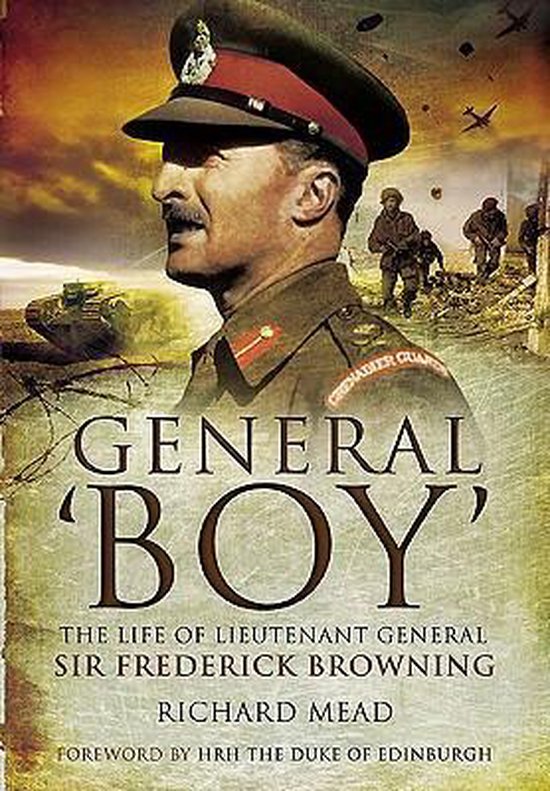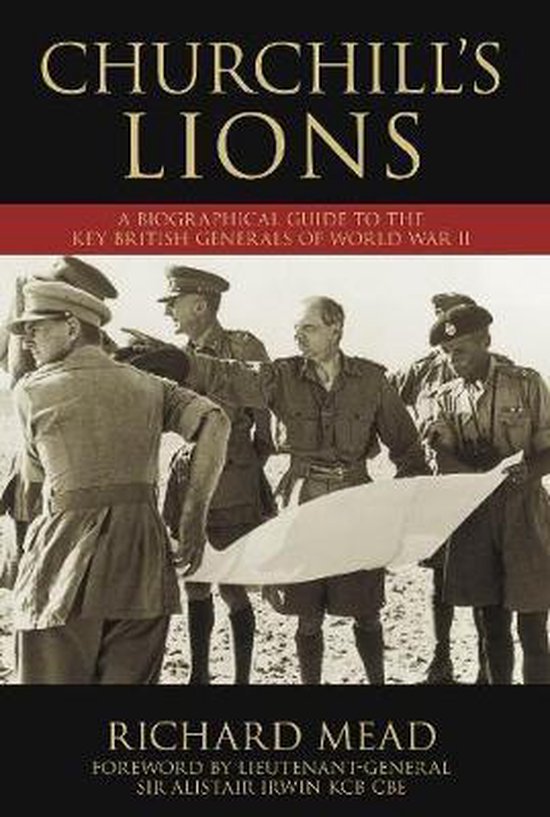Introduction
Frederick Browning was born on December 20, 1896, and joined the officer training corps during his education at Eton. During World War I, he served with the Grenadier Guards. When parachute troops and airborne troops were formed during World War II, Browning was appointed as the commanding officer. Toward the end of World War II, he became deputy Commander of the First Allied Airborne Army. After the war, he occupied several formal positions at the British Royal Court and officially retired in 1948. Frederick Browning passed away on March 14, 1965.

Major General Frederick Browning, 1st Airborne Division, Netheravon, October 2, 1942. Source: Imperial War Museum TR 174
Definitielijst
- Browning
- American weapon’s designer. Famous guns are the .30’’ and .50’’ machine guns and the famous “High Power” 9 mm pistol.
Youth
Frederick Arthur Montague Browning was born on December 20, 1896, in Kensington (London). He was the first son of wine merchant Frederick "Freddie" Henry Browning and his wife Anne "Nancy" Browning-Alt. Frederick had one older sibling, Helen Grace. The family and his relatives called him "Tommy." He attended West Downs School in Winchester, Hampshire, in 1905 and was sent to Eton in 1910. While at Eton, he joined the army class and the officer training corps. After his education, he wanted to attend the Royal Military College, Sandhurst. Frederick Browning did not manage to pass the entrance exam but was put forward by Edward Lyttelton, the principal of Eton. Because of this, Browning was admitted on December 27, 1914. While his school performance up to that point had been average, Browning was performing at Sandhurst at an excellent level and was widely regarded as a Cadet NCO of "H" Company. He graduated on June 16, 1915, and was assigned to the Grenadier Guards as 2nd Lieutenant.
Definitielijst
- Browning
- American weapon’s designer. Famous guns are the .30’’ and .50’’ machine guns and the famous “High Power” 9 mm pistol.
World War I
Initially, Browning was assigned to 4th Battalion, Grenadier Guards, which was in training at Bovington Camp (Dorset). When that battalion was sent to the Western Front in August 1915, Browning, because of his age and inexperience, was transferred to the 5th Battalion, which remained in reserve. In October 1915, his training was deemed complete, whereupon he transferred to 2nd Battalion, which was on the Western Front. On October 13, 1915, he assumed command of a platoon in that battalion. During his service on the Western Front, he was nicknamed "Boy." Browning was assigned to escort Major Winston Churchill in November 1915 when he was temporarily attached to 2nd Battalion after his part in the Gallipoli Campaign.
On January 6, 1916, Browning caught "trench fever" (an infectious disease caused by lice) and was sent back to England to be hospitalized. For his recovery, after spending two months in the hospital, he was stationed with 5th Battalion and later with the Guards Depot. He did not return to 2nd Battalion until October 6, 1916. He participated in the Battle of Pilckem Ridge on July 31, 1917, the Battle of Poelcapelle on October 9, 1917, and the Battle of Cambrai in November 1917. In December 1917, Browning led No. 2 Company during the battles for Gauche Woods. The fighting was dramatic. After two of the four company commanders were killed, Lieutenant Westmacott and Browning divided the remaining troops under their command and still managed to secure victory. Browning was promoted to acting Captain, and placed in command of No. 1 Company, and both he and Westmacott received the Distinguished Service Order for their merits during the Battle of Cambrai.
On December 14, 1917, Browning also received the French Croix de Guerre. Then on May 23, 1918, he was mentioned by name in an official report by his commanding officer to the supreme command for bravery shown in the face of the enemy (known as the Mentioned in Despatches). In September 1918, Browning was assigned as Aide de Camp to General Sir Henry Rawlinson, the commander of the British Fourth Army. After this, he returned to his own regiment. In November 1918, Browning was promoted to temporary Captain and appointed adjutant of the 1st Battalion, Grenadier Guards.
Definitielijst
- Browning
- American weapon’s designer. Famous guns are the .30’’ and .50’’ machine guns and the famous “High Power” 9 mm pistol.
- regiment
- Part of a division. A division divided into a number of regiments. In the army traditionally the name of the major organised unit of one type of weapon.
Interbellum
On November 24, 1920, Browning was promoted to war substantive Captain. In November 1921, Browning was given a position with the Guards' Depot at Caterham (Surrey) and he was appointed adjutant at Sandhurst in 1924. During his stay at Sandhurst, Browning introduced a new tradition during the Sovereign's Parade in 1926 that has been maintained to this day. Until then, the Adjutant followed the column on a white horse, separating from the column as it entered the Grand Entrance. However, Browning followed the column on horseback all the way in, up the steps, and through the doors of Sandhurst. On April 28, 1928, he retired from this position and was promoted to Major on May 22, 1928. After a refresher course at the Small Arms School, he was posted to 2nd Battalion, Grenadier Guards at Pirbright (Surrey). This position allowed him to do many sports. As a hurdler, he just missed out on the Olympic selection, but at the 1928 Winter Olympics in Sankt Moritz, Browning competed as a brakeman with the five-man Great Britain II bobsleigh team. He was also an avid sailor.
Frederick Browning married writer Daphne du Maurier on July 19, 1932. The couple went to live at Menabilly House in Fowey Harbour, Cornwall, and would eventually have three children; the marriage, despite problems, would last until Browning's death. On Feb. 1, 1936, Browning was promoted to Lieutenant Colonel and appointed Commanding Officer 2nd Battalion, Grenadier Guards. With this unit, he served in Egypt from 1936 to December 1937. On August 1, 1939, he left the Grenadier Guards and was promoted to Colonel on September 1 with February 1, 1939, as a Seniority. He was then appointed assistant Commander of the Small Arms School. Within a month he was promoted to Brigadier and appointed Commanding Officer.
Definitielijst
- Browning
- American weapon’s designer. Famous guns are the .30’’ and .50’’ machine guns and the famous “High Power” 9 mm pistol.
World War II
In 1940, Browning was appointed Commanding Officer of the 128th Infantry Brigade. He held this post until February 1941, after which he was appointed Commanding Officer of the 24th Guards Brigade Group, charged with defending London against an attack from the south.
On October 29, 1941, Frederick Browning was promoted to Major General and appointed Commanding Officer of the parachute troops and airborne troops on November 3. During this appointment, he was in charge of the formation of the 1st Airborne Division, which he was also given command of. In 1942, he obtained his glider pilot's license and received the Army Air Corps wings. Browning left for the United States in July 1942 for a tour of the training facilities of the airborne units there. Because of his attitude during this tour, Browning made few friends. He behaved arrogantly and made clear that in his opinion, the British airborne units were more professional than their American colleagues. This attitude would later cause problems for him in relations with American officers. Upon his return, Browning was able to convince the British Army leadership to allow a British airborne unit to participate in Operation Torch, the Allied invasion of North Africa in November 1942. The 1st Parachute Brigade was selected for this purpose. Because of its participation, the 1st Parachute Brigade received the nickname "Rote Teufel" (Red devils) from its German opponents. Browning later adopted this, unifying it to "Red Devils," an honorary name officially granted to British airborne troops by General Harold Alexander.
In March 1943, he relinquished his command of the 1st Airborne Division to be appointed as advisor on airborne training and operations of airborne forces at Eisenhower's Allied Forces Headquarters (AFHQ) in North Africa. In this position, he had his first standoff with Major General Matthew Ridgway, Commanding Officer of the U.S. 82nd Airborne Division regarding the attack plans for Operation Husky, the Allied landing in Sicily in the summer of 1943. Ridgway wanted to show these plans to Browning only after approval by Lieutenant General George Patton, Commanding Officer of the U.S. Seventh Army. While Patton supported Ridgway, Browning received support from Eisenhower and his Chief of Staff, Major General Walter Bedell Smith. Although Browning was proved right, this incident typified his relationship with the American senior officers.
Relations with British officers were not always smooth either. Several operational and personnel choices within the British airborne forces were made without Browning, who said that he felt that his position should be at least equal to that of commanders of the various army units and that he should be informed of such choices. Because of this attitude, he was quite often accused of being an "empire builder," someone who tried to establish his own empire within the military apparatus. For example, Major General Roy Urquhart was appointed commander of the 1st Airborne Division instead of Browning's choice of Brigadier Gerald Lathbury.
In August, Browning returned to England for an inspection of the newly formed 6th Airborne Division and then left for India to visit the 50th Indian Parachute Brigade.
On December 4, 1943, he was appointed Commanding Officer, Headquarters, Airborne Troops (21st Army Group), which he renamed Commanding Officer Airborne Corps. His promotion to Lieutenant General followed on January 7, 1944, effective as from December 9, 1943. On April 16, 1944, he was formally appointed Commanding Officer of the 1st Airborne Corps. In August 1944, this corps became part of the First Allied Airborne Army, which was commanded by American Lieutenant General Lewis Brereton. Browning was appointed deputy Commander.
At the time of planning for Market Garden, Browning strongly criticized proposals to land airborne troops on different days and the proposed landing sites at Arnhem. However, he was also responsible for ignoring reports of the presence of the 9. and 10. SS-Panzer-Division in the landing area. He also chose to land with his tactical headquarters at Nijmegen on the first day, a decision that brought him criticism because it required reserving gliders and tow planes that otherwise could have carried operational troops. It was also Browning who, as he himself stated after the war, ordered Gavin to prioritize the defense of the plateau near Groesbeek over the capture of the Waal bridges at Nijmegen. His criticism after Market Garden of the deployment of the 1st (Polish) Independent Parachute Brigade, and particularly of the attitude of its commander Major General Stanislaw Sosabowski, resulted in the removal of Sosabowksi from his command.
From December 1944 until July 1946, Browning served as chief of staff of Lord Louis Mountbatten's South East Asia Command in Kandy, Ceylon (today Sri Lanka), where he replaced the ailing Lieutenant General Henry Royds Pownall.
For his merit during World War II, Browning was awarded, among others, the Companion of the Order of the Bath (1943), the Knight of the Royal Victorian Order (1943), the Knight Commander of the Order of the British Empire (Jan. 1, 1946), a second Mentioned in Dispatches and the Commander in the Legion of Merit (1945).
Definitielijst
- Brigade
- Consisted mostly of two or more regiments. Could operate independently or as part of a division. Sometimes they were part of a corps instead of a division. In theory a brigade consisted of 5,000 to 7,000 men.
- Browning
- American weapon’s designer. Famous guns are the .30’’ and .50’’ machine guns and the famous “High Power” 9 mm pistol.
- Infantry
- Foot soldiers of a given army.
- invasion
- Armed incursion.
Post-World War II
In 1946 Browning was knighted and appointed military secretary in the War Office, a position he held until 1948. In January 1948, he was appointed comptroller and treasurer to HRH Princess Elizabeth (head of her personal staff), a position he held until her coronation as Elizabeth II in 1952, after which he was appointed treasurer to her husband Prince Philip, Duke of Edinburgh. Browning formally retired from the Army on April 5, 1948. He served as deputy chairman of the British Olympic Comittee in 1948, as a result of which he was involved as head of the British team in the 1948 Summer Olympics. In 1959, he received the Knight Grand Cross of the Royal Victorian Order, having already been named Knight Commander in that order in 1953. In 1962 Browning resigned as Commodore of the Royal Fowey Yacht Club, a position he had held since 1944.
In July 1957 Browning suffered a nervous breakdown as a result of excessive alcohol consumption, partly causing him to retire in 1959. He died on March 14, 1965, at his home Menabilly, near Fowey, Cornwall.
Definitielijst
- Browning
- American weapon’s designer. Famous guns are the .30’’ and .50’’ machine guns and the famous “High Power” 9 mm pistol.
Information
- Article by:
- Wilco Vermeer
- Translated by:
- Fernando Lynch
- Published on:
- 19-01-2025
- Feedback?
- Send it!
Related books
Sources
- BUCKINGHAM, W.F., Arnhem 1944, Tempus Publishing, 2002.
- GAVIN, J.M., On to Berlin, Viking Press, New York, 1978.
- GREENACRE, J.W., Churchill's Spearhead, Pen & Sword Aviation, Barnsley, 2010.
- MEAD, R., Churchill's Lions, Spellmount Publishers Ltd., Chalford, England, 2007.
- MEAD, R., General Boy: The Life of Lieutenant General Sir Frederick Browning, Pen & Sword Military, Barnsley, 2010.
- PUGSLEY, C. & HOLDSWORTH, A., Sandhurst - A Tradition of Leadership, Third Millennium Publishing Ltd., Londen, 2005.






